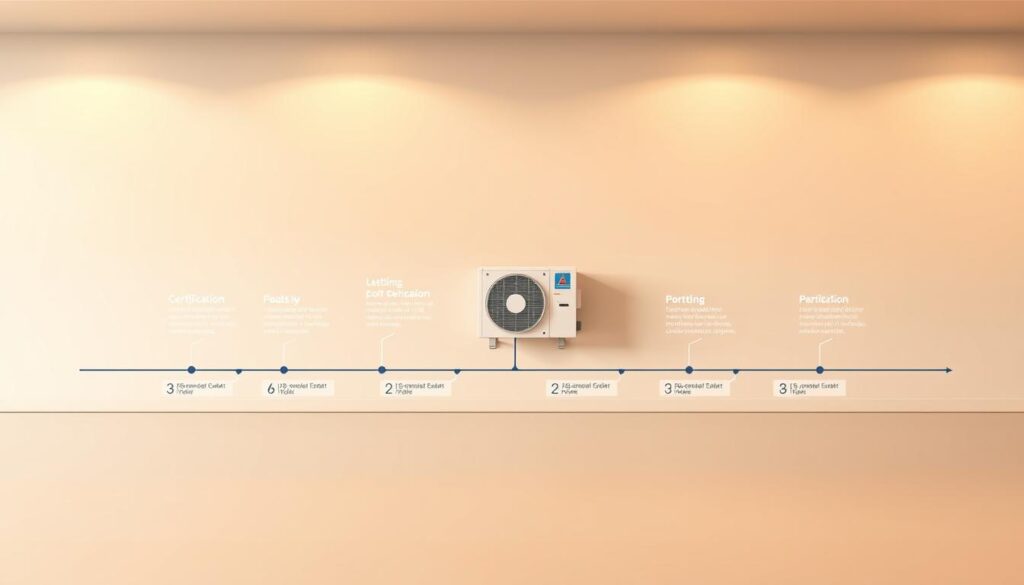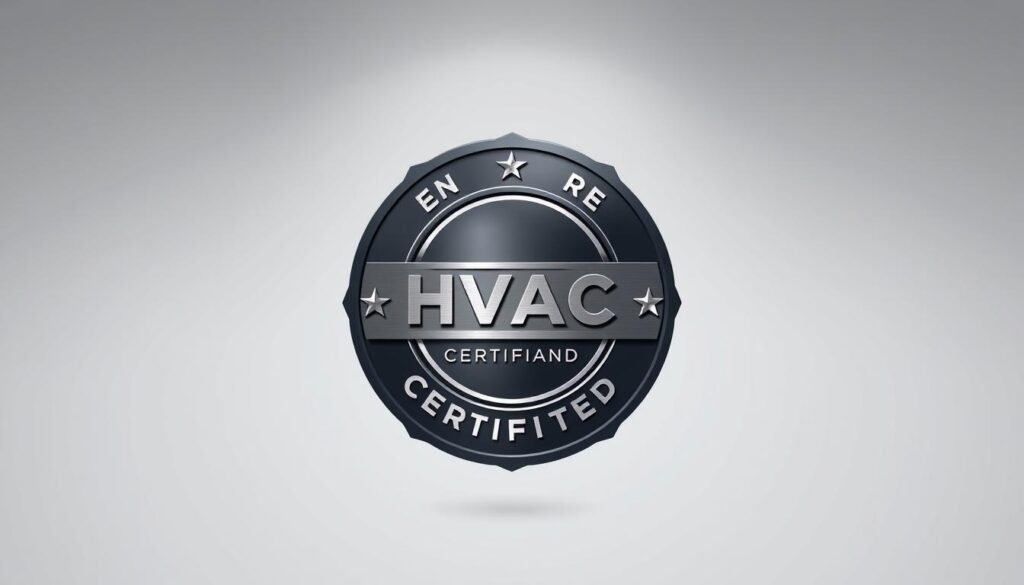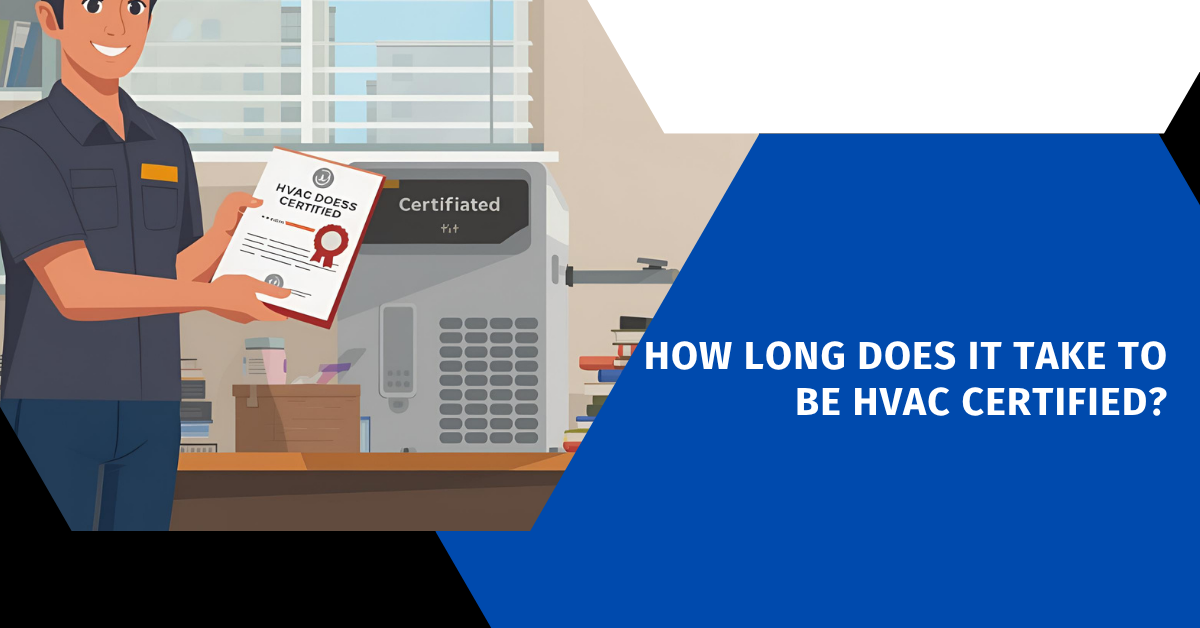Affiliate Disclosure
HVAC Guide Guys is a participant in the Amazon Services LLC Associates Program, an affiliate advertising program designed to provide a means for sites to earn advertising fees by advertising and linking to Amazon.
How Long Does It Take to be HVAC Certified? Are you curious about turning your technical skills into a successful HVAC career? Becoming an HVAC certified professional is a detailed process. Knowing the hvac certification timeline helps you plan your career path.

The HVAC industry is full of exciting opportunities for those ready to invest in their training. When looking into how long it takes to be hvac certified, you’ll see it varies. This depends on the program type, location, and how fast you learn.
HVAC technicians are in high demand across the U.S. Your certification journey includes thorough training, practical experience, and specialized education. This prepares you for a dynamic and rewarding career in heating, ventilation, and air conditioning systems.
Key Takeaways
- HVAC certification timelines range from 2-5 years
- Training involves both classroom instruction and hands-on experience
- Certification requirements differ by state
- Multiple program options exist for aspiring HVAC technicians
- Career opportunities grow with professional certification
Table of Contents
Understanding HVAC Certification Requirements
To become HVAC certified, you must follow certain steps and meet educational needs. This journey prepares you for a career in heating, ventilation, and air conditioning. It ensures you’re ready for success in the field.
Getting your HVAC license involves several important steps. Knowing these requirements helps you plan your career path well.
Basic Eligibility Criteria
To begin your HVAC certification journey, you must meet some basic requirements:
- Minimum age of 18 years
- High school diploma or equivalent (GED)
- Valid driver’s license
- Physical fitness for technical work
- Basic mathematical and reading comprehension skills
State-Specific Regulations
HVAC license rules differ by state. Each state has its own set of guidelines for certification. These may include:
| State Category | Certification Requirements | Additional Notes |
|---|---|---|
| Strict Regulation States | Comprehensive exam, multiple training hours | California, New York |
| Moderate Regulation States | Basic certification, limited training requirements | Texas, Florida |
| Minimal Regulation States | Limited certification process | Some Midwestern states |
Required Documentation
When you’re getting HVAC certified, you’ll need to gather several documents:
- Government-issued photo identification
- Educational transcripts
- Proof of completed training programs
- Medical fitness certificate
- Background check documentation
Reviewing and organizing these documents carefully will make your certification process smoother. It also shows your professionalism to employers.
Explore Our HVAC Shop
Looking for top-rated HVAC tools, parts, and accessories? Visit our shop and find the perfect solution for your needs.
Visit the ShopPre-Apprenticeship Training Duration and Components
Starting your HVAC career begins with pre-apprenticeship training. This phase lasts from 6 to 12 weeks. It gives you the basic skills and knowledge needed for success in this field.
This training covers important areas for becoming a skilled HVAC technician. You’ll learn fundamental skills that prepare you for more advanced training.
- Basic electrical systems understanding
- Safety protocols and workplace regulations
- Introduction to heating and cooling technologies
- Blueprint reading and technical documentation
- Basic tool and equipment handling
You’ll get hands-on experience through workshops and classroom lessons. The goal is to develop a solid theoretical foundation before entering a full apprenticeship program. Many technical schools and community colleges offer these programs. They give you a deep look into the HVAC industry.
Your training will mix theory and practical skills. You’ll learn about HVAC system types, basic maintenance, and safety practices. These are key for your future career.
How Long Does It Take to be HVAC Certified
Understanding the hvac certification timeline can be tricky. Knowing how long it takes to get certified helps you plan your career. The time needed varies based on the program and your chosen specialization.
There are different paths for those wanting to become HVAC technicians. Your journey will depend on whether you aim for residential or commercial work.
Residential Program Timeline
Residential HVAC programs are shorter. You can finish your certification in about:
- 2-3 years of total training
- Approximately 2,000-3,000 training hours
- Combination of classroom and hands-on experience
Commercial Program Duration
Commercial HVAC certification requires more time. The commercial program is longer:
- 4-5 years of in-depth training
- Roughly 6,000-9,000 total training hours
- Development of advanced technical skills
Total Training Hours Required
Here’s a detailed look at the training hours needed:
| Program Type | Classroom Hours | Practical Training Hours | Total Hours |
|---|---|---|---|
| Residential HVAC | 500-700 | 1,500-2,300 | 2,000-3,000 |
| Commercial HVAC | 1,000-1,500 | 5,000-7,500 | 6,000-9,000 |
Your specific hvac certification timeline may vary. It depends on your learning pace, the program’s intensity, and state rules. Dedication and consistent effort are essential for success.
Explore Our HVAC Shop
Looking for top-rated HVAC tools, parts, and accessories? Visit our shop and find the perfect solution for your needs.
Visit the ShopTypes of HVAC Certifications and Their Timeframes
Exploring HVAC certification programs can be tricky. There are many certifications for HVAC technicians to grow their skills and careers. Knowing about these certifications helps you choose the right path for your career.
The hvac technician certification process includes several key certifications that can enhance your marketability and expertise:
- EPA Section 608 Certification
- NATE (North American Technician Excellence) Certifications
- Manufacturer-Specific Certifications
- State-Level HVAC Licenses
Each certification focuses on different skills and systems. Let’s look at the most important ones:
| Certification Type | Focus Area | Typical Timeframe |
|---|---|---|
| EPA Section 608 | Refrigerant Handling | 1-2 Days |
| NATE Core Certification | General HVAC Knowledge | 3-6 Months |
| Specialized HVAC Certifications | Advanced System Expertise | 6-12 Months |
When picking hvac certification programs, think about your career goals and local market needs. Choosing the right certifications can greatly improve your job prospects.
“Continuous learning is the key to success in the HVAC industry” – HVAC Industry Expert
Remember, certification needs can change by state and employer. Always check the specific requirements for your HVAC career path.
The Apprenticeship Journey in Detail
To become an HVAC certified pro, you need a detailed apprenticeship. It mixes hands-on learning with formal classes. This path turns you from a beginner into a skilled HVAC technician.
The training lasts for several years. It’s a deep dive into learning, combining work and classroom time. You’ll gain the skills needed to get certified in HVAC.
On-the-Job Training Hours
Your apprenticeship includes lots of practical training. You’ll work with seasoned pros. Expect:
- Approximately 8,000 hours of real-world experience
- Direct mentorship from seasoned HVAC technicians
- Practical problem-solving in diverse work environments
Classroom Instruction Requirements
Classroom sessions add vital theoretical knowledge. You’ll get:
- 700-800 hours of structured educational programming
- Technical courses covering system design
- Safety protocols and industry regulations
- Advanced troubleshooting techniques
Skills Development Milestones
Your apprenticeship will take you through skill-building stages. Key milestones include mastering electrical systems, understanding refrigeration principles, and learning complex installation techniques. Each step boosts your skills and gets you ready for certification.
“An HVAC apprenticeship is not just a job training program—it’s a complete path to a fulfilling technical career.” – HVAC Industry Expert
After this tough apprenticeship, you’ll be a top-notch HVAC pro. You’ll be ready to face challenges in homes and businesses.
Explore Our HVAC Shop
Looking for top-rated HVAC tools, parts, and accessories? Visit our shop and find the perfect solution for your needs.
Visit the ShopCost and Investment Timeline for HVAC Certification

Getting an HVAC certification needs careful planning. The cost can be from $12,000 to $25,000, based on your path and location. Knowing these costs helps you plan your career.
Here are the main financial parts of getting your hvac license:
- Pre-apprenticeship training programs: $12,000 – $15,000
- Technical school tuition: $3,000 – $10,000
- Certification exam fees: $50 – $300
- Professional tools and equipment: $1,500 – $3,000
There are ways to manage these costs:
- Community college programs with lower tuition
- Employer-sponsored training opportunities
- Federal and state financial aid
- Trade school scholarships
“Investing in your HVAC certification is investing in a stable, high-demand career path.” – Professional HVAC Association
The benefits of getting certified are clear. HVAC technicians can earn $45,000 to $75,000 a year. Experienced ones can make over $100,000.
Think about your career goals when looking at the costs. The right training and certification can lead to great earnings in HVAC.
Career Progression and Salary Expectations
Starting the hvac technician certification process opens up many exciting career paths. As you work towards becoming hvac certified, you’ll find a career full of growth and financial rewards.
At the beginning of your HVAC career, you’ll learn about the different paths you can take. Your early steps will lay the groundwork for a fulfilling and successful career.
Entry-Level Positions
Right after you get certified, entry-level HVAC technicians can look forward to good starting salaries. Salaries usually range from $35,000 to $45,000 a year. This depends on where you work and your skills.
- Residential system installation
- Commercial maintenance support
- Junior technician roles
Advanced Certification Benefits
Getting advanced certifications can really boost your career. These certifications show you’re an expert and can make you more valuable in the job market.
- Higher pay rates
- More complex project opportunities
- Management track
Income Growth
As you get more experience and skills, your salary will increase a lot. Experienced HVAC technicians with advanced certifications can make $70,000 or more a year.
Professional development is the key to unlocking your full HVAC industry.
Planning your career, learning continuously, and striving for excellence will help you reach your highest earning and satisfaction in this field.
Explore Our HVAC Shop
Looking for top-rated HVAC tools, parts, and accessories? Visit our shop and find the perfect solution for your needs.
Visit the ShopIndustry Requirements and Professional Standards

Understanding the HVAC certification world is complex. It’s not just about technical skills. Professional standards are key to quality service and expertise.
The HVAC field has strict standards thanks to regulatory bodies. Organizations like the North American Technician Excellence (NATE) set high benchmarks. These ensure technicians meet top quality and safety levels.
- State licensing boards regulate HVAC license requirements
- National certification programs validate technical competencies
- Ongoing education ensures current technological knowledge
Staying in HVAC certification programs means constant learning. Technicians must take recurring professional development courses. This keeps them up-to-date with new tech and industry trends.
| Certification Level | Continuing Education Hours | Renewal Frequency |
|---|---|---|
| Entry-Level Technician | 8-16 hours annually | Every 1-2 years |
| Advanced Technician | 24-40 hours annually | Every 2-3 years |
Professional standards protect everyone. They keep the HVAC industry safe, reliable, and efficient. This is true for both homes and businesses.
Conclusion
Becoming an HVAC certified professional takes careful planning. The time it takes can be anywhere from 6 months to 5 years. This depends on your chosen path and career goals. You’ll need dedication, technical skills, and a commitment to learning.
Every certification path offers chances for career growth. Whether you choose residential or commercial training, your investment will pay off. The HVAC certification timeline shows the depth of learning needed in today’s tech world.
Being an HVAC pro is a lifelong journey, not just a goal. Your hard work, learning, and keeping up with industry standards will set you apart. Each step you take brings you closer to a fulfilling career.
Your own effort and passion will shape your success in HVAC. The skills and certifications you gain will lead to new opportunities. The HVAC field is always changing with new technologies.
FAQ
How long does it typically take to become a certified HVAC technician?
What are the basic requirements to start HVAC certification training?
Do HVAC certification requirements differ by state?
What types of certifications do I need to become a professional HVAC technician?
How much does HVAC certification training cost?
How long does it typically take to become a certified HVAC technician?
What are the basic requirements to start HVAC certification training?
Do HVAC certification requirements differ by state?
What types of certifications do I need to become a professional HVAC technician?
How much does HVAC certification training cost?
FAQ
How long does it typically take to become a certified HVAC technician?
Becoming a certified HVAC technician can take 6 months to 5 years. This depends on your path. You’ll need pre-apprenticeship training, apprenticeships, and certifications.
Community college programs last 6-24 months. Apprenticeships can take 4-5 years.
What are the basic requirements to start HVAC certification training?
To start, you need a high school diploma or GED. You must be 18 or older and have a driver’s license. A basic physical exam is also required.
Some programs check your math and reading skills first.
Do HVAC certification requirements differ by state?
Yes, they do. Each state has its own rules. You’ll need to know the training hours and exam requirements for your state.
Some states require long apprenticeships. Others have easier certification processes. Always check with your state’s licensing board.
What types of certifications do I need to become a professional HVAC technician?
You’ll need several certifications. These include the EPA Section 608 Certification and NATE certification. You might also need manufacturer-specific certifications.
Specialized certifications include commercial refrigeration and heat pump systems.
How much does HVAC certification training cost?
Costs vary from
FAQ
How long does it typically take to become a certified HVAC technician?
Becoming a certified HVAC technician can take 6 months to 5 years. This depends on your path. You’ll need pre-apprenticeship training, apprenticeships, and certifications.
Community college programs last 6-24 months. Apprenticeships can take 4-5 years.
What are the basic requirements to start HVAC certification training?
To start, you need a high school diploma or GED. You must be 18 or older and have a driver’s license. A basic physical exam is also required.
Some programs check your math and reading skills first.
Do HVAC certification requirements differ by state?
Yes, they do. Each state has its own rules. You’ll need to know the training hours and exam requirements for your state.
Some states require long apprenticeships. Others have easier certification processes. Always check with your state’s licensing board.
What types of certifications do I need to become a professional HVAC technician?
You’ll need several certifications. These include the EPA Section 608 Certification and NATE certification. You might also need manufacturer-specific certifications.
Specialized certifications include commercial refrigeration and heat pump systems.
How much does HVAC certification training cost?
Costs vary from $1,200 to $15,000. Community college programs cost $3,000-$10,000. Trade school programs can be $5,000-$15,000.
Apprenticeships often have lower costs. They offer paid on-the-job training.
What is the difference between a certificate and a license in HVAC?
A certificate shows you’ve finished a training program. A license lets you legally work as an HVAC technician. Licenses require passing exams and meeting experience and education requirements.
Can I become an HVAC technician through online training?
Some online coursework is possible. But, HVAC certification needs hands-on training. Most programs mix online learning with in-person training.
Online-only programs are rare. The job requires skills learned through direct experience.
What is the average starting salary for a newly certified HVAC technician?
New HVAC technicians earn $35,000 to $45,000 a year. With experience and more certifications, you can earn $50,000-$75,000 or more.
How often do I need to renew my HVAC certification?
Renewal times vary by state and certification. Most certifications need renewal every 1-3 years. You’ll need to complete continuing education and sometimes pass refresher exams.
What are the physical requirements for becoming an HVAC technician?
You need to be physically fit. You’ll lift heavy equipment, work in tight spaces, climb ladders, and work in different weather. Good stamina, strength, and flexibility are key.
,200 to ,000. Community college programs cost ,000-,000. Trade school programs can be ,000-,000.
Apprenticeships often have lower costs. They offer paid on-the-job training.
What is the difference between a certificate and a license in HVAC?
A certificate shows you’ve finished a training program. A license lets you legally work as an HVAC technician. Licenses require passing exams and meeting experience and education requirements.
Can I become an HVAC technician through online training?
Some online coursework is possible. But, HVAC certification needs hands-on training. Most programs mix online learning with in-person training.
Online-only programs are rare. The job requires skills learned through direct experience.
What is the average starting salary for a newly certified HVAC technician?
New HVAC technicians earn ,000 to ,000 a year. With experience and more certifications, you can earn ,000-,000 or more.
How often do I need to renew my HVAC certification?
Renewal times vary by state and certification. Most certifications need renewal every 1-3 years. You’ll need to complete continuing education and sometimes pass refresher exams.
What are the physical requirements for becoming an HVAC technician?
You need to be physically fit. You’ll lift heavy equipment, work in tight spaces, climb ladders, and work in different weather. Good stamina, strength, and flexibility are key.

